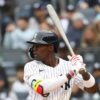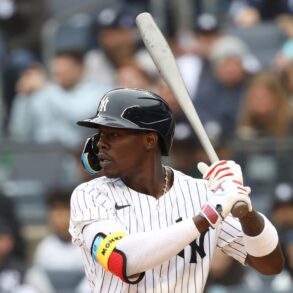The suspension of left fielder Jurickson Profar for 80 games is a problem. The inflammation in Reynaldo López’s right shoulder might be a bigger problem. But the real trouble for the Atlanta Braves started around Thanksgiving, when they backed out of a deal for free-agent right-hander Jeff Hoffman over a concern with his shoulder.
Advertisement
The Braves intended Hoffman to be the centerpiece of their offseason restructuring, a distinction that ultimately fell to Profar, who signed a three-year, $42 million free-agent contract. Their plan was to convert Hoffman from a reliever to a starter, just as they did with López a year ago. Hoffman, 32, also could have returned to their bullpen at any point if the team’s rotation proved deep enough, providing flexibility that more conventional free-agent starters could not.
The Baltimore Orioles also nixed a deal with Hoffman in January, prompting him to sign a three-year, $33 million contract with the Toronto Blue Jays. Hoffman told SportsNet that both the Braves and Orioles “came back with offers with less money. So, you can read into that what you want.” The Braves did not sign any other free-agent pitcher to a major-league deal. And five games into the season, both their rotation and bullpen already look thin.
Yet, even with the one-two punch the Braves absorbed Monday on Profar and López, even with their 0-5 record, they still might be OK. They expect right-hander Spencer Strider and catcher Sean Murphy to return from the injured list by the end of April and right fielder Ronald Acuña by the start of May. And with Profar’s suspension for a banned performance-enhancing substance unpaid, they will save approximately $5.8 million in salary and luxury-tax payroll.
Profar will be ineligible for the postseason if the Braves qualify, but the team is now almost $14 million under the luxury-tax threshold, according to Fangraphs. The actual amount of cash available is even higher, according to a source briefed on the club’s situation. And the only cost for exceeding the threshold would be financial; the Braves, by going over a third straight year, would pay a 50 percent tax on every dollar they spent above $241 million. Hardly an oppressive penalty, if the Braves even get there.
Advertisement
President of baseball operations Alex Anthopoulos generally is aggressive at the trade deadline, and now is in position to pursue virtually any player who becomes available, regardless of salary. Miami Marlins righty Sandy Alcántara figures to be the biggest prize, assuming the Marlins are willing to move him. With Profar set to return in late June, Anthopoulos also will have time to assess the state of his offense before the deadline July 31.
Still, what might have been with Hoffman could linger.
The Jays signed Hoffman to be their closer, and he certainly looked healthy, pitching scoreless innings in back-to-back games Saturday and Sunday. The Braves reportedly wanted to sign him to a five-year deal for between $45 and $48 million. Hoffman told SportsNet he initially would have been a starter before transitioning back to the bullpen in the latter years of the deal.

Jeff Hoffman celebrates a save with the Blue Jays on Sunday. (John E. Sokolowski / Imagn Images)
The Braves viewed Hoffman as an ideal fit, a high-upside play with a five-pitch mix and the potential to follow López’s path to the All-Star Game as a starter. After the deal fell through, they passed on pitchers such as Charlie Morton and José Quintana, pure starters who could not pitch in relief. Hoffman, on the other hand, could have moved back to the bullpen to create opportunities for younger, less established starters such as Grant Holmes, AJ Smith-Shawver and Ian Anderson, whom the Braves ultimately traded to the Los Angeles Angels for left-handed reliever José Suarez.
Holmes, who allowed four runs in four innings in his season debut against the 6-0 Los Angeles Dodgers on Monday, loomed particularly large in the Braves’ plans. He is out of options, so he could not be sent to the minors without the risk of him getting claimed on waivers. And in 33 2/3 innings over seven starts sprinkled throughout last season, he struck out 40 and walked nine.
Advertisement
The Braves appeared set with Chris Sale, López and Spencer Schwellenbach at the top of their rotation. The return of Strider would leave them with only one other spot. If Anthopoulos could have traded for, say, Garrett Crochet, he would not have worried so much about Holmes. But he did not view any of the lesser free-agent starters as enough of an upgrade.
Obviously, Anthopoulos did not anticipate López hitting the injured list after only one start. But now the Braves likely will need to keep both Holmes and Smith-Shawver in their rotation even after Strider returns, and Sale’s 177 2/3 innings last season were his most since 2017. His durability is hardly assured.
The bullpen, too, is something of a mess. The Braves announced in November that righty Joe Jiménez would be out eight to 12 months after undergoing surgery to repair cartilage in his left knee. They lost lefty reliever A.J. Minter to the New York Mets in free agency. Yet, the only free-agent relievers they added were on minor-league contracts — Enyel De Los Santos, Buck Farmer, Héctor Neris, Craig Kimbrel and Jesse Chavez.
Neris allowed five runs in two appearances spanning one inning. On Monday, the Braves designated him for assignment to make room for Chavez’s fifth stint with the club in five years. Chavez allowed a home run by Kiké Hernández on Monday night.
Then there is the outfield. The Braves signed Profar, a switch-hitter, to address their need for a left-handed bat. Alex Verdugo, another late signee, eventually might fill that role, but will need time at Triple A to get into playing shape. Before the announcement of Profar’s suspension Monday, the Braves acquired outfielder Stuart Fairchild from the Cincinnati Reds for cash considerations. Fairchild, a right-handed hitter, had been designated for assignment.
Acuña will be in right field once he returns. Michael Harris II will remain in center. The Braves, at least until Verdugo is ready, will see what they can get out of Jarred Kelenic and Bryan De La Cruz. But eventually, Anthopoulos will need to address some combination of his outfield, rotation and bullpen. And The Athletic’s Keith Law recently ranked the Braves’ farm system the third worst in baseball.
Anthopoulos’ relatively quiet offseason, combined with the money the team will save on Profar’s suspension, should give the Braves enviable financial muscle. But on and off the field, they are playing from behind.
(Top photo of Reynaldo López: Gregory Bull / Associated Press)
This post was originally published on this site be sure to check out more of their content.







